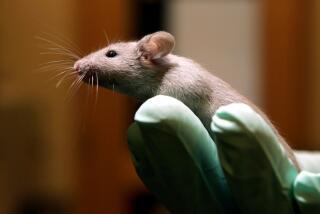Eggs of women may not be finite
- Share via
WASHINGTON — Scientists have produced strong new evidence challenging one of the most fundamental assumptions in biology: that female mammals, including women, are born with all the eggs they will ever have.
In a provocative set of experiments involving mice, Chinese researchers have shown for the first time that an adult mammal can harbor primitive cells in her ovaries that can become new eggs and produce healthy offspring, they reported Sunday.
Much more research is needed to confirm and explore the findings, but the work raises the tantalizing possibility that it could someday lead to new ways to fight a woman’s biological clock, perhaps by stockpiling her egg-producing cells or by stimulating them to make eggs again.
The findings also could help speed stem cell research by providing scientists with a new source of eggs, which are crucial for producing embryonic stem cell lines tailored to individual patients and diseases but difficult to obtain.
“This is a very big deal,” said Roger Gosden, director of reproductive medicine at Weill Cornell Medical Center in New York, who was not involved in the research, published online by Nature Cell Biology.
Some species remain fertile through their lives, and men produce sperm daily. But for at least half a century the dominant scientific tenet has been that women and all other female mammals are born with all the eggs they will ever have, and that stock is slowly depleted with age. For women, the belief has been that most of their eggs are gone by the time they reach middle age, prompting menopause and leaving them infertile.
Although several studies in recent years have raised questions about that belief, those claims remained highly controversial. The new research marks the first time scientists have obtained cells from an adult mammal that appear capable of producing new eggs and healthy offspring.
“If you are looking to disprove that females cannot make new eggs, this paper proves it. It’s a really significant paper,” said Jonathan Tilly, a professor of obstetrics, gynecology and reproductive biology at Harvard Medical School who published some of the most controversial research suggesting that women remain capable of producing new eggs.
Other researchers, however, remained cautious, saying the work needed to be repeated more carefully in mice and other species to validate the findings. Even then, it would remain unclear whether there are any practical implications for women, some experts said.
“The aging process of the human egg differs fundamentally from that of the mouse egg,” said David Keefe, a professor of obstetrics and gynecology at the University of South Florida. “Except at Disney World, humans are not large mice.”
For the study, Ji Wu of Shanghai Jiao Tong University in China and colleagues removed ovaries from mice and sifted through millions of cells to identify a small number that appeared to have characteristics of female “germ line” stem cells, which theoretically would be able to become eggs.
After identifying those cells, the researchers reported, they coaxed them to multiply in the laboratory. Those obtained from newborn mouse ovaries continued to multiply for more than 15 months and those from adult ovaries for more than six months. A series of tests appeared to confirm that they were indeed precursor cells for eggs, the researchers reported.
They then tagged the cells with a jellyfish protein that would make them glow fluorescent green so they could be traced, and injected them into the ovaries of other mice that had been rendered mostly infertile with chemotherapy.
Some of the ovaries were examined, revealing that at least some of the fluorescent cells had matured into eggs. Other mice that got the cells bred and produced offspring.






